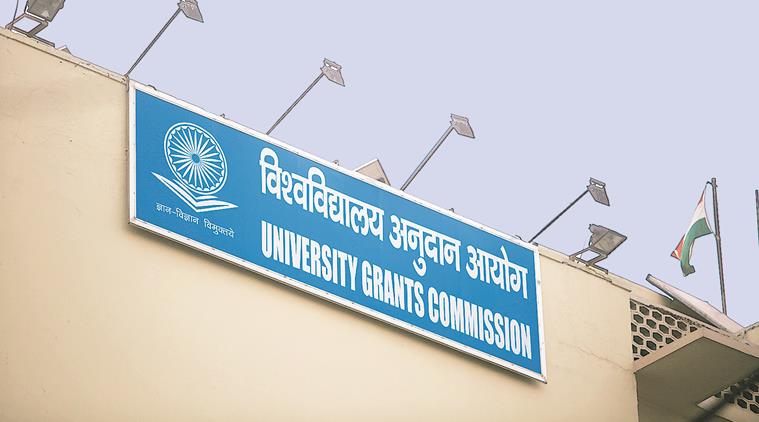A higher abdication
Crucial opportunity to bring legislation transforming quality of higher education is lost.

Separating the funding functions of the Commission is a positive step and will rid it of the bad name it had acquired over the years. (File)
It was anticipated that the University Grants Commission (UGC) Act would be replaced by an avant garde legislation capable of comprehensively handling the present and future problems of higher education in the country. The UGC Act had traversed a journey of over 60 years and gathered moss, baggage as well as wisdom on the way, which required urgent sifting and reinvention. The Ministry of Human Resource Development (MHRD) has now put out the draft Higher Education Commission of India (Repeal of University Grants Commission) Act, 2018. What are its implications for higher education in the country? Is it positive and visionary, marking a departure from the past, or more of the same?
The all-powerful regulator syndrome persists, creating a supra university which inhibits autonomy and innovation in the system. The default status of a good university is to be autonomous. The spirit of Clause 15 (3) of the draft Act is no different to Section 12 of the UGC Act where wide powers are given to the Commission. Research, learning outcomes and academic performance are already within the purview of universities. The standards laid down by regulators invariably cater to the institutions which are at the bottom of the pyramid but are applied to all universities, including the best, inhibiting excellence. That is the reason why the IITs, IIMs and other good institutions recoil at the thought of UGC control.
Separating the funding functions of the Commission is a positive step and will rid it of the bad name it had acquired over the years. It can now concentrate more on formulation of regulations, which is its core duty. However, it would have been preferable if, instead of the funds being released by the MHRD directly, an arms-length body had been created for the purpose, as was proposed in the draft bill for the National Commission for Higher Education and Research (NCHER) in 2012.
Both the National Knowledge Commission as well as the Yashpal Committee had, as long ago as in 2008, strongly recommended the setting up of a single regulatory authority. Presently, there are 13 regulators in the area of higher education, each functioning independently and often times issuing contradictory regulations. Although the draft mentions that in the case of Bar Council of India and Council of Architecture, their role will be limited to professional practice, implying that the education part will be with the university system, nothing has been mentioned for other regulators, especially the Medical Council of India. The draft seems to have missed the opportunity to even clarify who the regulator in technical education is. The silence on these issues is deafening.
Accreditation is an important tool for quality improvement in learning outcomes. The draft also empowers the commission to set up a robust accreditation system. Unfortunately, instead of creating an autonomous accrediting agency as was proposed in the National Accreditation Regulatory Authority Bill in 2012, we seem to be falling into the same trap of making it a subordinate body of the commission. This perpetuates the present unhealthy system which conflates the sanctioning, now authorisation role, with that of assessing and is akin to the cop and magistrate being rolled in one.
One of the fundamentals of the present UGC Act specifies that degrees can be awarded only by a university deemed to be a university and an institution specially empowered by Parliament in this behalf. The present draft removes that restriction and by virtue of authorisation by UGC, any higher education institution in India, whether university or not, can become entitled to award diploma, degree etc. The danger is that it could lead to a free-for-all situation. On the other hand, if handled judiciously, this can pave the way for more autonomous institutions in the country and free the good colleges from the stranglehold of the universities. The established colleges will be able to give degrees and expand. The pressure to create new private universities and deemed-to-be-universities could reduce.
The present UGC Act empowers it under Section 22 (3) to define a degree, including its duration and nomenclature. The present draft removes that provision which can create chaos as different authorities will be free to give different nomenclature to a degree/diploma with variable duration. It will not only create difficulty in terms of equivalence and acceptance but will also cause great distress in explaining the disparity in terms of the standards of such degrees.
The present system of affiliation has had a restrictive effect on the quality of higher education. The draft has, in fact, exacerbated the situation by implicitly allowing any university, including private and deemed-to-be-universities, to affiliate. This could lead to an unhealthy competition and scramble for colleges for affiliation, especially by private universities, for purely commercial reasons.
The present system of affiliation has had a restrictive effect on the quality of higher education. The draft has, in fact, exacerbated the situation by implicitly allowing any university, including private and deemed-to-be-universities, to affiliate. This could lead to an unhealthy competition and scramble for colleges for affiliation, especially by private universities, for purely commercial reasons.
Though skill development has been mentioned as being part of its remit in Section 15(3), more teeth could have been given to the Commission in mainstreaming skills into the education system. The skill programmes and courses are terminal in nature and given the stigma that society unfortunately attaches to working with the hands, it has failed to get mass acceptability. All this could change once the university system embraces skills as its integral part.
Lastly, online education and blended learning are the order of the day and probably also of the future. Open and Distance Learning is inextricably linked with the face-to-face education mode. The draft does well by stating in Section 31 (3) that the two will remain together and no separate body will be created, as was suggested by the Madhav Menon Committee.
Lastly, online education and blended learning are the order of the day and probably also of the future. Open and Distance Learning is inextricably linked with the face-to-face education mode. The draft does well by stating in Section 31 (3) that the two will remain together and no separate body will be created, as was suggested by the Madhav Menon Committee.
The bill was a crucial opportunity to bring about transformational legislation impacting on the quality of higher education in the country for years to come. In its present shape, it is more of the same, with no radical departure from the past. But what is even more important is the sincerity with which the Commission is set up. If they are men of short stature, no matter how good the legislation, it will be business as usual. At present, entrusting the selection to bureaucrats and co-opted academicians does not inspire confidence. If, on the other hand, we have the courage to appoint outstanding academics like Shanti Swaroop Bhatnagar, Humayun Kabir, D S Kothari and others, the Commission will fly irrespective of whether there is new legislation or not.
Thakur is former education secretary, GoI and Mantha is former chairman, AICTE
For all the latest Opinion News, download Indian Express App
More From Ashok Thakur
- Chinks in the BoardWhat happens when one of the world’s largest school education systems is pilloried in the media for all the wrong reasons? Credibility is the first…
- Education Budget 2018 analysis: Government continues to pamper premier institutions like IITsIn the Union Budget 2018, all the major announcements cater to the top class institutions whether it is the emphasis on research, setting up of Institutes…
- Wheat from university chaffThere must be more clarity, better regulation with regard to deemed universities. The Tandon Committee recommendations could help arrive at a blueprint...








































No hay comentarios:
Publicar un comentario